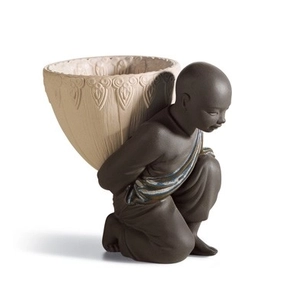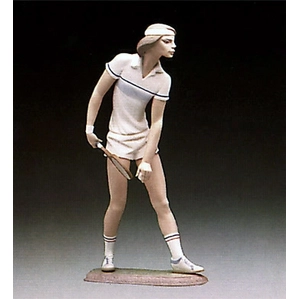Lladro XVIIIth Century Coach Porcelain Figurine 01001485
Status: In Stock Available | Condition: New | Edition:Limited Edition Porcelain Figurine | Edition Size: Limited Edition 500 | Dim:H (in) 17.7 W (in) 44.4 Length (in)11.8 | Lladro| Item #: 01001485
Price: $ 64,800.00 USD..
4/18/2025 $21,600.00 1st payment
5/18/2025 $21,600.00 2nd payment
6/17/2025 $21,600.00 3rd & final payment
payments are automatically deducted from your credit card.
Lladro XVIIIth Century Coach Porcelain Figurine is eligible for 3 equal layaway payments in store, with a credit card of $21,600.00 made every 30 days over a period of three months. US & Canada orders only.
Lladro is renowned for its exquisite porcelain figurines, blending fine porcelain art with delicate craftsmanship to create timeless collectible sculptures. Each Lladro piece is handmade, offering a unique work of art that captures the elegance and emotion of figurative sculpture. The brand's contemporary sculpture combines traditional porcelain artistry with modern design, creating a wide array of decorative art that appeals to collectors and art enthusiasts alike. Known for its luxury collectibles, Lladro continues to innovate, bringing a sense of grace and beauty to homes with its delicate figurines. From cultural craftsmanship to modern porcelain sculptures, Lladro's figurine collection offers stunning pieces that add sophistication and artistic flair to any setting.
As an option you may also pay for Lladro XVIIIth Century Coach Porcelain Figurine using Paypal or with your Amazon Account(*select items). Please note that all orders must be delivered to a physical address verified by Paypal or Amazon.
XVIIIth Century Coach. Sculptor Francisco Catalá. Porcelain Type Stoneware gloss. Base Included. Limited Edition 500 pcs. - 01001485
NOTES: XVIIIth Century Coach. Limited edition gloss finish porcelain sculpture of a XVIII century carriage drawn by four white horses. This great saloon in the Baroque style is inspired by the original models housed at the Coach Museum in Lisbon, and is one of the most complex and ambitious works by artists of the Lladró High Porcelain workshop. It is an example of extraordinarily beautiful, dainty ornamentation. The nobles of the European courts extended the magnificence of their palaces to the streets with these magnificent carriages. In this limited edition, attention is given to everything, down to the smallest detail: the four horses, servants´ uniforms, the gowns of the couple, and, above all, the decoration of the carriage. Some fifty different colours were used in its decoration and the application required roughly a hundred hours of painstaking work by the artists. The completion of each piece requires the participation of more than twenty different specialists who together, devote about 300 hours to the task. The result is a single piece which, once fired, is over a metre long and weighs around twenty kilograms.. The Collection Shop is an Authorized Lladro Dealer.. A Collection Shop representative will contact you to confirm your order along with price and delivery time.
XVIIIth Century Coach Porcelain Figurine by Lladro
image Copyright © 2025 by Lladro

Gift Card Purchase
E-Gift Cards from The Collection Shop are the perfect way to gift art enthusiasts. Click below for more details!
Lladro bio
Lladro was founded in 1953 when Juan, Jose, and Vicente, three brothers born of local farmers and endowed with great artistic talent, formed a small family company in the Valencian village of Almacera, Spain. Since then, Lladro has undergone an amazing metamorphosis from an artisan workshop to a huge firm of international scope enjoying continual growth. The company management has remained in the hands of the Lladro family, the owners of the firm, since its inception. The creative team started out by adapting styles from past eras, but it was not long before certain characteristics appeared that would soon shape what was to become the unique Lladro style.

Lladro POTPOURRI GIFT (BLACK) Porcelain Figurine - 01012493
..Layaway with 3 pymts of $0.00

Lladro Male Tennis Player 1982-87 Porcelain Figurine - 11426M
..Layaway with 3 pymts of $0.00












